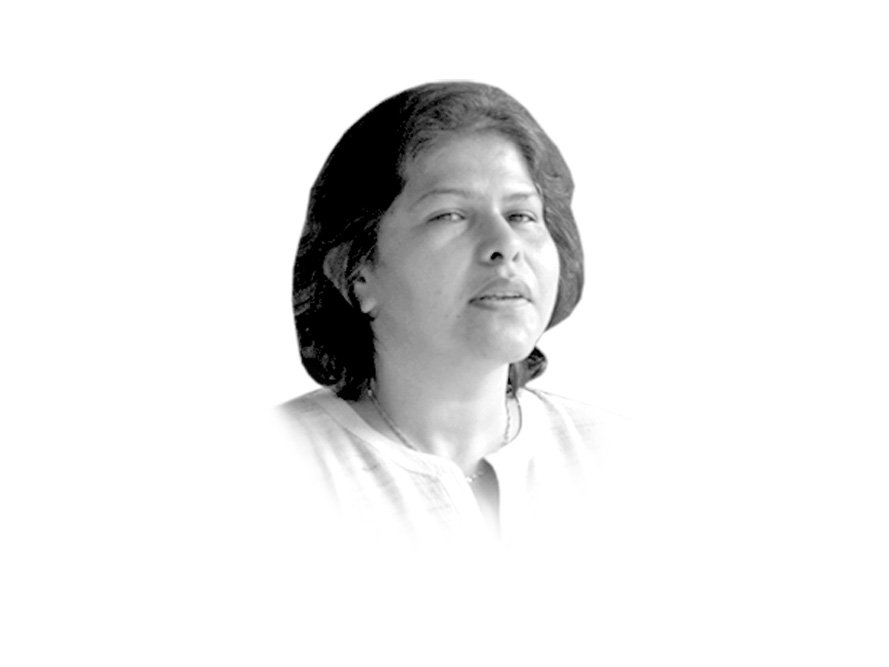
Those protesting the change in name must realise two things urgently. First, going against the new name could draw wild reaction that could risk the monument. Second, why would the place be renamed differently, especially in the absence of an alternative voice from the civil society? What does the city have in the name of civil society except a couple of corrupt NGOs pushed by certain state functionaries pretending to represent an alternative voice? The tragedy of liberalism in Pakistan (even larger South Asia) is that it is now mainly confined to drawing rooms and Twitter. It is cute to see people taking risks on social media and then rising to prominence due to threats on Facebook or Twitter. The fear of violent reaction in real life is too intense for many to do more.
The name change simply represents strong religionism in society. This was inevitable in a state that was manufactured, as historian Faisal Devji records in his very exciting new book, The Muslim Zion, around the concept of religious nationalism that challenges the nation-state’s inherent formula of territoriality. According to Devji, Israel and Pakistan were the only two states for which the new manufacturing concept was followed. Hence, the state had to turn into, what the author of Making Sense of Pakistan, Farzana Sheikh, would consider as, Allama Iqbal’s Pakistan. It is informally and in an unstructured way, run through Sharia law. While we waste time in arguing what Mohammad Ali Jinnah actually wanted the nation to be, others, who are more influential, are slowly working towards making a case that the founding father never hinted at making the state liberal and secular. For example, a civil servant and columnist recently challenged authenticity of Jinnah’s August 11 speech.
How could liberalism survive in a country where the liberal-secular elite ensured the death of this principle? The liberal Liaquat Ali Khan, who otherwise impressed his Western audience with his high capacity to ‘hold his drink’ gave a structure to the principle of religious nationalism by incorporating religion as the formula for governance in the Objectives Resolution 1949. Subsequently, the state’s title was changed from dominion to Islamic Republic in the country’s first 1956 Constitution. The Objectives Resolution established religion as the country’s grundnorm.
Another watershed was 1974, when Zulfikar Ali Bhutto, another liberal leader, implemented the grundnorm by declaring Ahmadis non-Muslims. For those who argue that the culpability of harm brought to Ahmadiya people lay with Ziaul Haq, the fact is that Bhutto’s decision was critical in shifting the direction of the state from secular to more formally religious. The decision meant that the state had changed its character and would now adjudicate on matters of faith and like any religious state, for example Israel, would define who was a Muslim or not. Of course, Zia’s 10 years cemented the shift almost completely.
We hear many excuses for the engagement of the liberal leadership with the religious right and its ideology. The best and the easiest is realpolitik or convenient accommodation of the right wing in order to save the day. Opinion on liberal accommodation of the right can then be classified between those who feel sorry and sympathetic versus others who get extremely angry at this kind of leadership. However, those falling under the category of liberal tend to forget that they suffer from the same problem as those they blame for narrowing social space in this country through their decisions. The key problem with the liberal elite is that they tend to live and survive on their self-created small islands.
A few days ago, I had a chance to visit a tea shop in Lahore. I could have been anywhere — Paris, London or New York. Nothing wrong with a nice ambience except that it can also put you to sleep. The eatery symbolised one of the many small islands that the liberal elite have created for themselves where they can not only withdraw but also imagine that nothing has changed around them. So, religion is declared as a poor man’s obsession which, at best, can be treated through investing in milder forms of religious discourse. Any inconvenience that may occur can be managed through negotiating the territorial space between the liberal haves versus religious have-nots. Thus, the New Year parties may be shifted away from the religious downtown to the relatively open farmhouses in suburbia. Such negotiation of physical space averts the threat to personal lifestyle but it also makes people ignore that a social metamorphosis is taking place.
There is yet another kind of liberal voice that tends to do image management through accepting that religion is here to stay. Then they selectively take nice parts of religious history to argue that there is no problem with a religious polity and that violence occurs only due to poverty. It is indeed a tough century ahead in which bloodletting is inevitable while we find a formula to reconstruct both religion and liberal space.
Published in The Express Tribune, January 9th, 2014.
Like Opinion & Editorial on Facebook, follow @ETOpEd on Twitter to receive all updates on all our daily pieces.
COMMENTS (15)
Comments are moderated and generally will be posted if they are on-topic and not abusive.
For more information, please see our Comments FAQ













What's is problem with our educated elite always prepared to bow demands of obscurantists. From Liaqat Ali Khan to Bhutto down to civil & military bureaucrats and now judges are in action.
@Khurram Nazir: It was called Zellins Coffee House on the lower mall. I also wrote a comment supporting this article, but obvioiusly somebody up in the edit room did not like it. Good luck
I would lile to know the name of cafe in Lahore; And was it tea only?
@gp65: Good comment. Thanks. I especially agree about your analysis of the situation in Bangladesh. It is a very valid and interesting comparison.
@Lal Din:
Do not be hard with Indians who live in the west but dream about their land in the context of western democracy. They do not practice a religion but a cult which has no morals or ethics. Hindu culture does not prohibit caste system, nor sexism or sati and similar traditions. They are fully aware of this and have made great progress through their legal system and democratic secular structures to treat such actions as illegal. This is not to say that such a c.ourse will suppress completely the activities and the fall out from their social and cultural life style. But at least Indian written laws will conform though not fully correlate with those of the western Nations..Ii is scary but true that Hinduism allows its followers to practice Atheism or theism with the exception of Islam.
Rex Minor
@gp65: Are you saying that India is a functional democracy and does not mix religion with politics? If so, I am both impressed and amazed. Please stay within the confines of the essay. What you are saying is not contextual. Also have the rapes, or corruption disappeared? If you think so, you may not be living in India but some fools' paradise.
The problem in this society is not a widening gulf between religious and seculars (which is indeed happening as a symptom), but of ignorance and intolerance which is widespread in both the above mentioned. Until we educate people and overcome this hurdle, the society would continue to see this divide and similar incidents. Targeting liberty and imposition of a faulty religion is condemnable as well as criticising religion and its role in society at various levels by the pseudo-liberals. The ignorance has resulted not only in religious fanatics, but also liberal fascists in this country and as I said earlier are increasing rather than moving towards finding common points towards reconciliation and understanding, and in making a unified goal oriented society.
Oh my God! If I am correct this was the chowk (intersection) at the Railway Road. The road coming from Bikanaray (may be some other gate) Gate and going towards Model Town crosscutting the main artery from the railway station to Cantonment area and a movie theatre in the corner. But there were also other chowks with fawaras. I am talking of 1962 and what a magnificent city it was. I was too young and attended Abbasia High School (one of the greatest schools I attended during my father's military career). There was one fawara in front of the Bahwalpur Bank and a technical school across from it. Another one was in front of library, and one each near SE College and BVH. I do not want to sound disrespectful but what Khatam-e-Nabwat had to with the glamor of the city. Oh Lord! I had to see these days. How sad and painful. You robbed a functional state from the heirs in the name of One Unit. Now you are Islamizing it. Shame on you and shame on the judiciary which has such judges.
Very interesting read. The way religion has been thrust on this country is not through a natural progression but a forced imposition. The result can only be an implosion of this religious imposition......and the loser, as is already evident, is religion. The fact that the country loses simaltenously is incidental.
This is not Pakistan of Jinnah But Bakistan of Mullah who opposed Jinnah tooth and nail.This Bakistan is bleeding and is running out of blood just to expire.We are waiting for that moment.Pakistan can not co-exist with Bakistan any more.
Ayesha ji,
Marvelous!! That was as clear a death knell as could have been rung.
"It is indeed a tough century ahead in which bloodletting is inevitable while we find a formula to reconstruct both religion and liberal space."
It really should have been "both religion and culture". The liberal space has vanished into the virtual space some time ago. I doubt it will reappear in this land in the next century.
Too much of everything is Bad.Religion is no exception.Surely the government is failing on the front of HUMANITY.